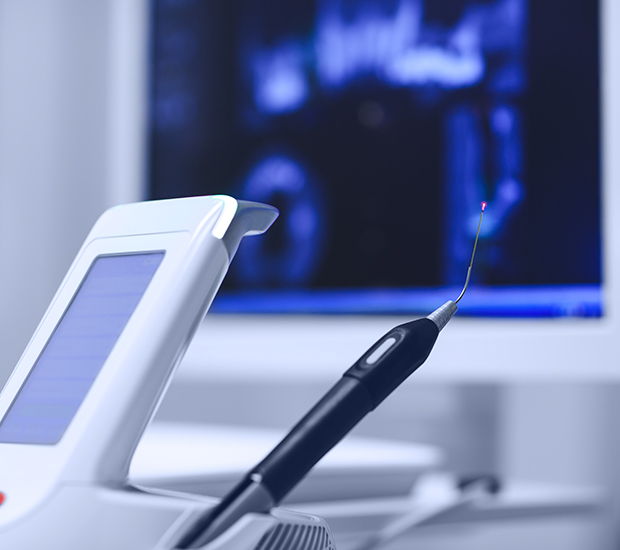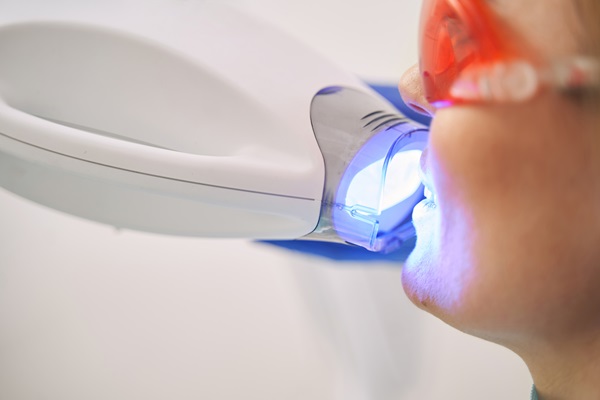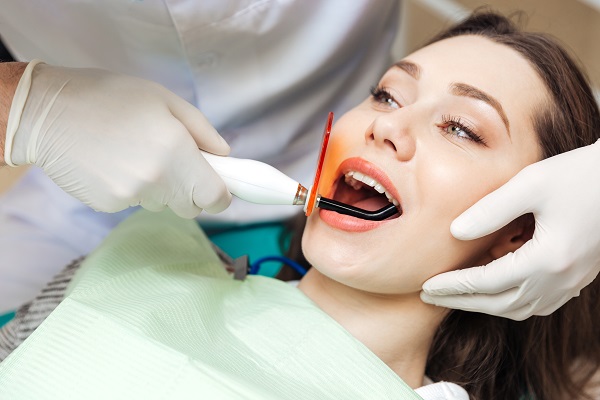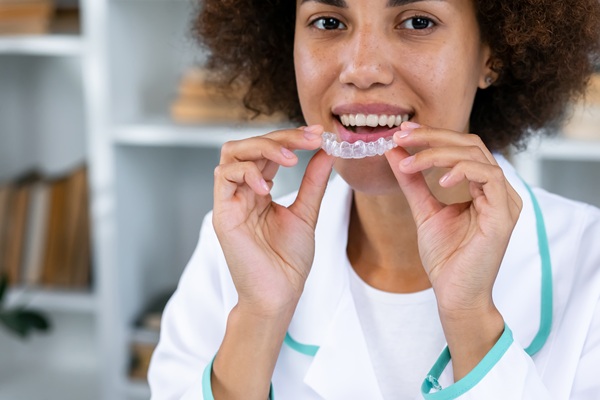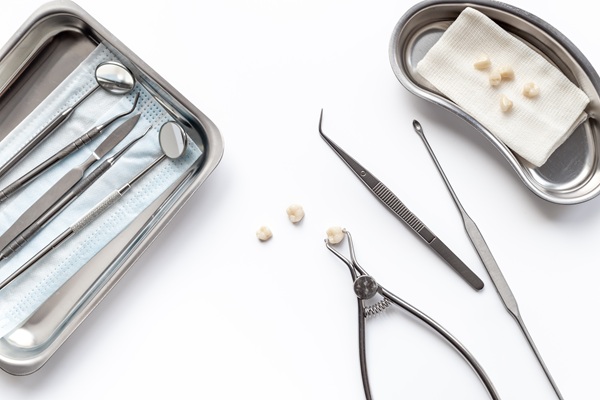Laser Dentistry Draper, UT
If you are interested in a new, fresh approach to dental care, consider laser dentistry. At Draper Parkway Dental, we can use laser dentistry to treat our patients' oral health concerns in a way that is comfortable and effective. If you live in Draper or surrounding area and are looking for modern dental care, give us a call. Lasers are revolutionizing dentistry, but a family dentist still typically uses traditional metal dental tools, making it necessary to visit a laser dentist. As a laser dentist in Draper, we can use lasers in the majority of our procedures to correct damage without causing irritation. We invite you to call (801) 252-4439 and experience the difference that laser dentistry can make.
Laser Dentistry for Those with a Dental Phobia
If you suffer from dental anxiety or avoid visiting the dentist for fear of discomfort, you are not alone. This is a common condition that you do not have to live with. Laser dentistry has revolutionized dental care to the point where procedures can be performed in a way that is so comfortable that you will barely notice you are having dental work done. We treat patients throughout the Draper area that no longer have concerns regarding dental care after experiencing how pleasant a laser dental treatment can be.
Laser Dentistry Provides a Better Experience
By performing laser dental treatments, we can eliminate the common reasons why people are uncomfortable during dental procedures – heat, pressure, and vibration. Once eliminated, many people do not even need anesthesia. That is why we can often complete fillings without our patients requesting an injection. Additionally, laser technology allows us to more accurately target specific areas of your mouth. The laser is incredibly thin so we can make precise incisions when necessary. We can even use lasers to correct issues like tooth decay. The difference is that the surrounding gum tissue is not impacted or irritated in any way. With traditional metal dental tools, a dentist may irritate the surrounding tissue with an accidental slip of the hand. By removing this risk, our patients can undergo the same dental procedures but with a faster recovery time. Simultaneously, our patients are more comfortable than if the procedure was performed in the traditional manner. For example, laser dental fillings achieve the same results but without the discomfort. Simultaneously, lasers can also be used to help stop the bleeding so that when a more intensive procedure is being performed, gauze may be unnecessary or only used temporarily. Patients can appreciate the opportunity to have dental work completed in this non-invasive way. If you would like to experience laser dentistry for yourself, we invite you to call 801-252-4439 and schedule an appointment.
Check out what others are saying about our laser dentistry services on Yelp: Laser Dentistry Draper
Laser Gum Surgery
Perhaps one of the most significant advances that gentle dentistry has made is associated with treating gum disease. This condition is so common that most adults will suffer from some form of gum disease in their lifetime. The symptoms typically start with red, swollen, and bleeding gums but if left untreated, it can lead to gum recession. Receding gums are particularly dangerous because more of the tooth and roots will become exposed and open for attack by bacteria. Many people suffer bone and tooth loss as a result. Treating gum disease, therefore, is critical for preserving your teeth as you age. The traditional method of treatment involves pulling the gums away from the tooth and using metal dental tools to scrape off the bacteria, plaque and tartar that has formed on the tooth but underneath the gums. This can be uncomfortable to say the least. Laser dentistry has completely changed the procedure. We offer periodontic care, and our patients can have their gum disease treated by using lasers to break up the plaque and tartar. This will remove the irritant that is causing the gum disease in the first place. Typically, the gums will then return to good health. Since this is a non-invasive procedure, our patients start to feel better right away. Not all dentists in the Draper area offer this new method of treating gum disease, making it important to visit a laser dentistry office.
What Can Soft Tissue Laser Dentistry Do For You
A laser is a small beam of intensely focused light. Laser therapy allows for precise control during soft tissue treatment. In addition, the lasers can perform several functions. In addition to removing tissue, they can also be used to reduce bleeding and swelling, seal blood vessels and seal nerve endings.
There are many benefits to laser therapy instead of traditional surgical procedures. The diseased areas can be targeted accurately and precisely meaning less unnecessary pain. In fact, the amount of swelling, pain, and bleeding are greatly reduced due to the less invasive nurture of laser therapy. All of these factors result in a shorter healing and recovery time.
Following are some of the most common applications for laser applications in dentistry:
- Soft Tissue Surgery. When done with laser instead of a scalpel, laser technology results in decreased post-operative pain.
- Periodontal Procedures. Lasers allow dentists to not only gain easier access to deeper calculus deposits, but they help the dentist target only damaged tissue which allows for better healing.
- Implant Recovery. Because soft-tissue modification around the implant can be done quickly using laser technology, it minimizes the trauma from the procedure if another method were used.
- Treating Aphthous Ulcers. These are more commonly known as canker sores – and if you’ve had one, you know they can be painful. Now, instead of just using topical treatment, dentists can use lasers to promote quick healing without the use of chemicals.
- Frenectomy. When a soft tissue laser is used for this procedure, there is often no need for anesthesia. An added bonus? Very little bleeding.
Procedures that use Soft Tissue Laser Dentistry
- Gingival Troughing for Crown Impressions; Gingivectomy & Gingivoplasty
- Gingival Incision & Excision; Hemostasis & Coagulation
- Excisional & Incisional Biopsies
- Soft-Tissue Crown Lengthening & Fibromal Removal
- Frenectomy & Frenotomy
- Implant Recovery & Exposure of Unerupted Teeth
- Incision & Drainage of Abscess
- Pulpotomy as an Adjunct to Root Canal Therapy & Reduction of Gingival Hypertrophy
- Operculectomy & Vestibuloplasty
- Leukoplakia & Oral Papillectomies
- Treatment of Canker Sores, Herpetic & Aphthous Ulcers of the Oral Mucosa
- Sulcular Debridement
- Laser Soft-Tissue Curettage
- Removal of Highly Inflamed Edematous Tissue Affected by Bacteria Penetration of the Pocket Lining & Junctional Epithelium
- Definition of Cosmetic Dentistry Terminology
- Allograft
- An allograft is a graft of tissue from a donor within the same species as the patient that is not a genetic relative.
- Alveolar Ridge
- The alveolar ridge is the bony ridge for one of the jaw ridges located on the roof of the mouth or on the bottom of the mouth.
- Autograft
- An autograft is a graft of tissue from one portion of an individual’s body to another.
- Bleachorexia
- Bleachorexia is when people continue to abuse teeth whitening solutions without consulting professionals, causing significant damage to their enamel and gums in the process.
- Cap Splint
- A cap splint is a plastic or metallic device that professionals may use to treat mandible or maxillary fractures and cover crowns of teeth.
- Cosmetic Dentistry
- Cosmetic dentistry is generally used to refer to any dental work that improves the appearance (though not necessarily the function) of a person’s teeth, gums and/or bite.
- Crown Lengthening
- Crown lengthening is a surgical procedure that increases the extent of a tooth structure for restorative or esthetic purposes.
- Dental Crown
- A crown is an artificial tooth, usually consisting of porcelain, which covers the top of the implant to provide people with an aesthetically pleasing and fully-functional tooth.
- Dentin Hypersensitivity
- Dentin hypersensitivity is when the enamel wears down on the tooth enough that the dentin faces exposure and will cause great levels of pain when a person applies pressure to the tooth or drinks hot/cold beverages.
- Dentist
- A dentist, also known as a dental surgeon, is a doctor who specializes in the diagnosis, prevention, and treatment of diseases and conditions of the oral cavity.
Questions Answered on This Page
Q. What happens during the laser dentistry experience?
Q. How does laser teeth whitening work?
People Also Ask
Q. Do receding gums get in the way of a cosmetic procedure?
Q. Can cosmetic dentistry help improve the functionality of my teeth?
Q. Is it dangerous to bleach teeth at home without professional supervision?
Definition of Cosmetic Dentistry Terminology
- Allograft
- An allograft is a graft of tissue from a donor within the same species as the patient that is not a genetic relative.
- Alveolar Ridge
- The alveolar ridge is the bony ridge for one of the jaw ridges located on the roof of the mouth or on the bottom of the mouth.
- Autograft
- An autograft is a graft of tissue from one portion of an individual’s body to another.
- Bleachorexia
- Bleachorexia is when people continue to abuse teeth whitening solutions without consulting professionals, causing significant damage to their enamel and gums in the process.
- Cap Splint
- A cap splint is a plastic or metallic device that professionals may use to treat mandible or maxillary fractures and cover crowns of teeth.
- Cosmetic Dentistry
- Cosmetic dentistry is generally used to refer to any dental work that improves the appearance (though not necessarily the function) of a person’s teeth, gums and/or bite.
- Crown Lengthening
- Crown lengthening is a surgical procedure that increases the extent of a tooth structure for restorative or esthetic purposes.
- Dental Crown
- A crown is an artificial tooth, usually consisting of porcelain, which covers the top of the implant to provide people with an aesthetically pleasing and fully-functional tooth.
- Dentin Hypersensitivity
- Dentin hypersensitivity is when the enamel wears down on the tooth enough that the dentin faces exposure and will cause great levels of pain when a person applies pressure to the tooth or drinks hot/cold beverages.
- Dentist
- A dentist, also known as a dental surgeon, is a doctor who specializes in the diagnosis, prevention, and treatment of diseases and conditions of the oral cavity.
Back to top of Laser Dentistry
